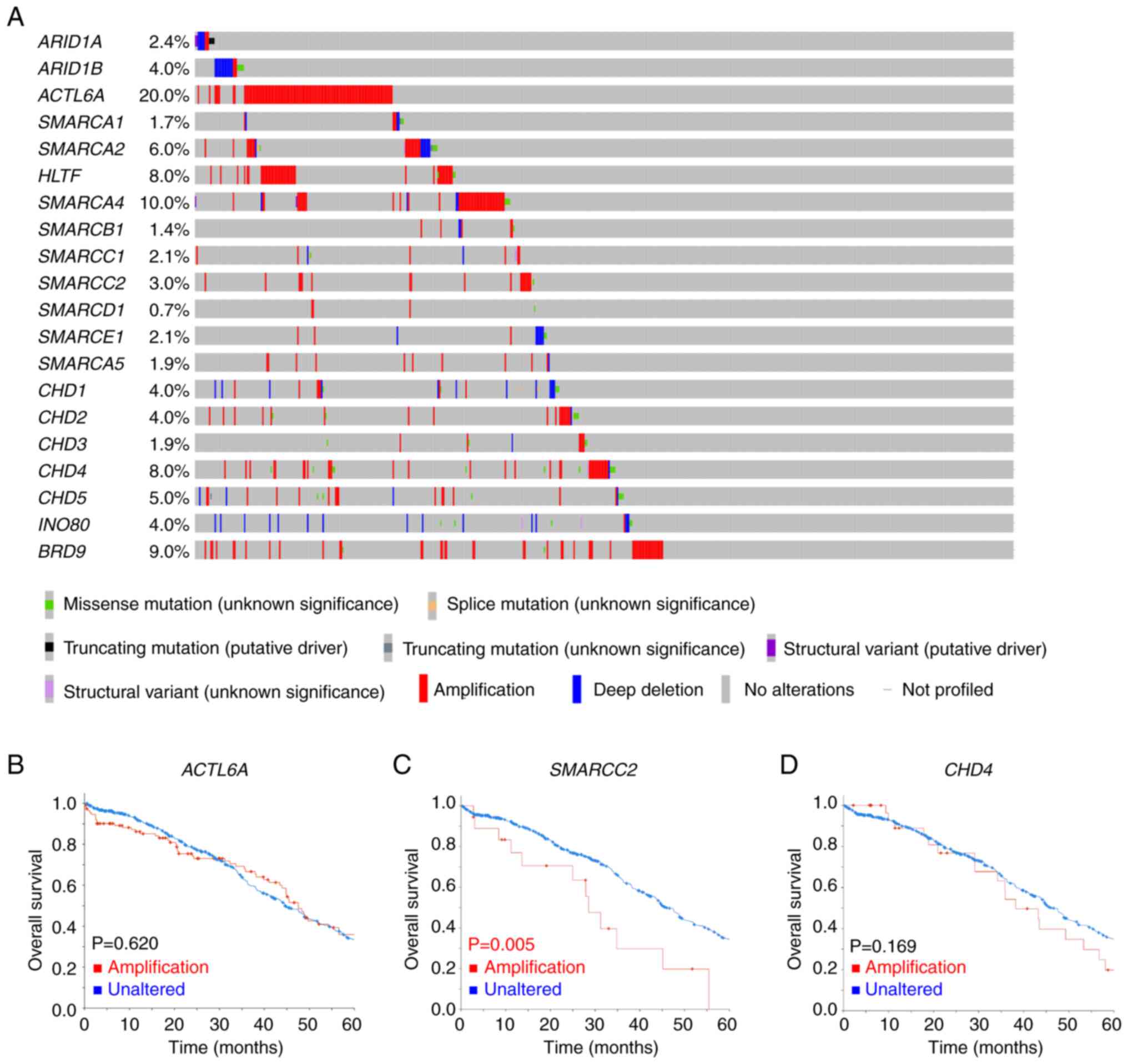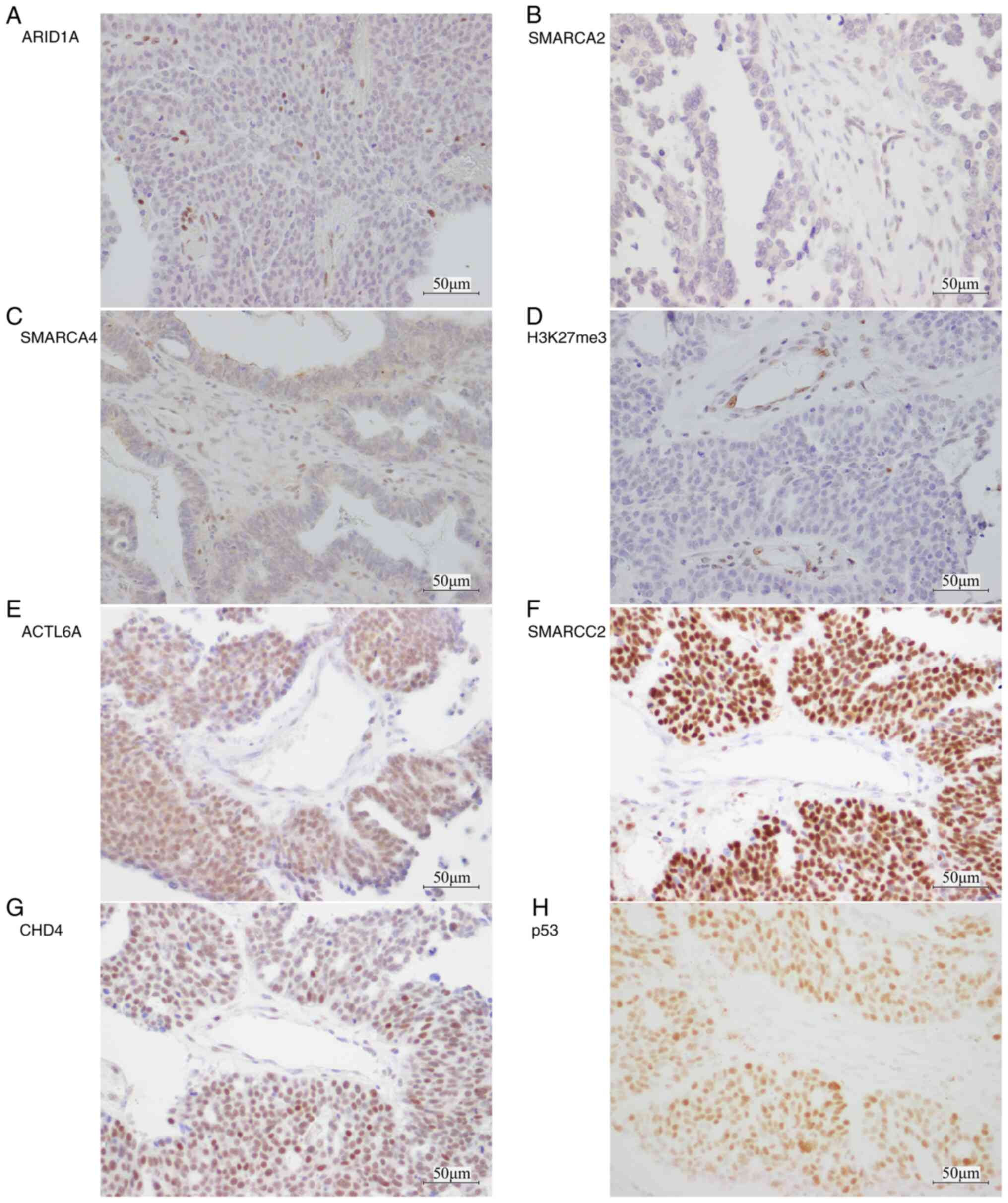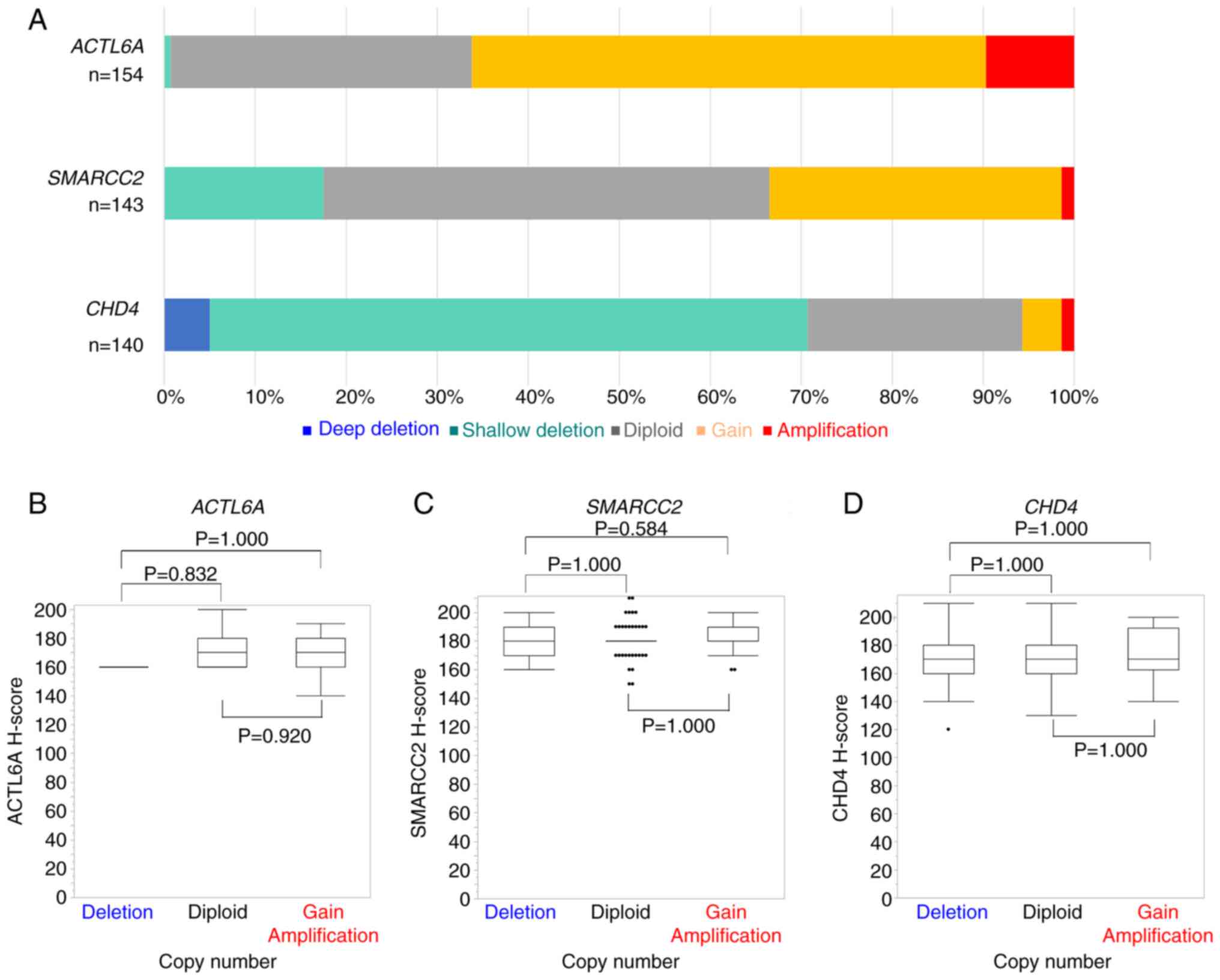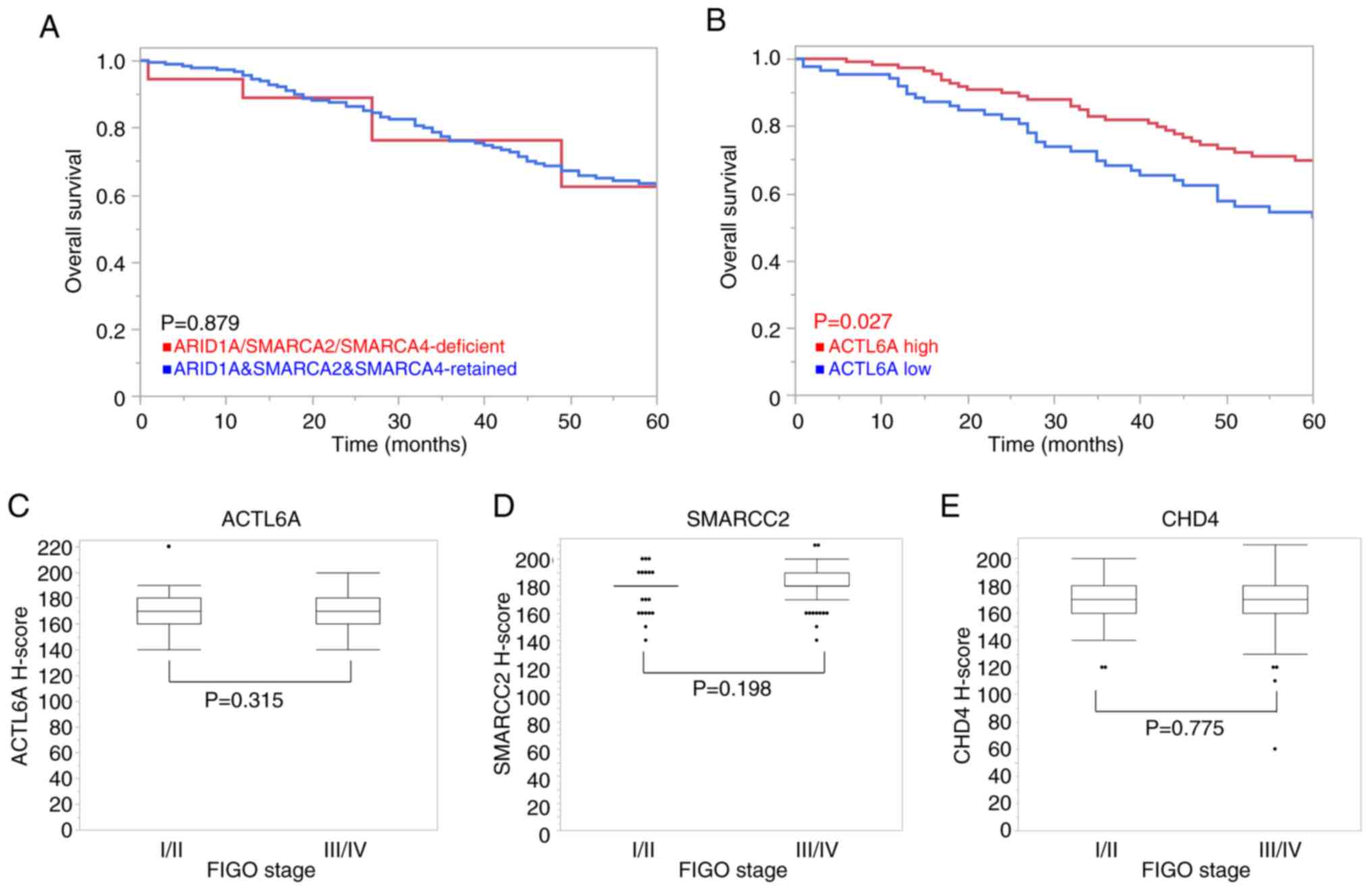|
1
|
Kim J, Park EY, Kim O, Schilder JM, Coffey
DM, Cho CH and Bast RC Jr: Cell origins of high-grade serous
ovarian cancer. Cancers (Basel). 10:4332018. View Article : Google Scholar : PubMed/NCBI
|
|
2
|
Peres LC, Cushing-Haugen KL, Köbel M,
Harris HR, Berchuck A, Rossing MA, Schidkraut JM and Doherty JA:
Invasive epithelial ovarian cancer survival by histotype and
disease stage. J Natl Cancer Inst. 111:60–68. 2019. View Article : Google Scholar : PubMed/NCBI
|
|
3
|
Barlin JN, Long KC, Tanner EJ, Gardner GJ,
Leitao MM Jr, Levine DA, Sonoda Y, Abu-Rustum NR, Barakat RR and
Chi DS: Optimal (≤1 cm) but visible residual disease: Is extensive
debulking warranted? Gynecol Oncol. 130:284–288. 2013. View Article : Google Scholar : PubMed/NCBI
|
|
4
|
Dao F, Schlappe BA, Tseng J, Lester J,
Nick AM, Lutgendorf SK, McMeekin S, Coleman RL, Moore KN, Karlan
BY, et al: Characteristics of 10-year survivors of high-grade
serous ovarian carcinoma. Gynecol Oncol. 141:260–263. 2016.
View Article : Google Scholar : PubMed/NCBI
|
|
5
|
Iacobuzio-Donahue CA: Epigenetic changes
in cancer. Annu Rev Pathol. 4:229–249. 2009. View Article : Google Scholar : PubMed/NCBI
|
|
6
|
Baylin SB and Jones PA: Epigenetic
determinants of cancer. Cold Spring Harb Perspect Biol.
8:a0195052016. View Article : Google Scholar : PubMed/NCBI
|
|
7
|
Hasan N and Ahuja N: The emerging roles of
ATP-dependent chromatin remodeling complexes in pancreatic cancer.
Cancers (Basel). 11:18592019. View Article : Google Scholar : PubMed/NCBI
|
|
8
|
Kadoch C and Crabtree GR: Mammalian
SWI/SNF chromatin remodeling complexes and cancer: Mechanistic
insights gained from human genomics. Sci Adv. 1:e15004472015.
View Article : Google Scholar : PubMed/NCBI
|
|
9
|
Khalique S, Naidoo K, Attygalle AD,
Kriplani D, Daley F, Lowe A, Campbell J, Jones T, Hubank M, Fenwick
K, et al: Optimised ARID1A immunohistochemistry is an accurate
predictor of ARID1A mutational status in gynaecological cancers.
Pathol Clin Res. 4:154–166. 2018. View Article : Google Scholar : PubMed/NCBI
|
|
10
|
Le Gallo M, O'Hara AJ, Rudd ML, Urick ME,
Hansen NF, O'Neil NJ, Price JC, Zhang S, England BM, Godwin AK, et
al: Exome sequencing of serous endometrial tumors identifies
recurrent somatic mutations in chromatin-remodeling and ubiquitin
ligase complex genes. Nat Genet. 44:1310–1315. 2012. View Article : Google Scholar : PubMed/NCBI
|
|
11
|
Wiegand KC, Shah SP, Al-Agha OM, Zhao Y,
Tse K, Zeng T, Senz J, McConechy MK, Anglesio MS, Kalloger SE, et
al: ARID1A mutations in endometriosis-associated ovarian
carcinomas. N Engl J Med. 363:1532–1543. 2010. View Article : Google Scholar : PubMed/NCBI
|
|
12
|
Ramos P, Karnezis AN, Craig DW, Sekulic A,
Russell ML, Hendricks WPD, Corneveaux JJ, Barrett MT, Shumansky K,
Yang Y, et al: Small cell carcinoma of the ovary, hypercalcemic
type, displays frequent inactivating germline and somatic mutations
in SMARCA4. Nat Genet. 46:427–429. 2014. View Article : Google Scholar : PubMed/NCBI
|
|
13
|
Oyama Y, Shigeta S, Tokunaga H, Tsuji K,
Ishibashi M, Shibuya Y, Shimada M, Yasuda J and Yaegashi N: CHD4
regulates platinum sensitivity through MDR1 expression in ovarian
cancer: A potential role of CHD4 inhibition as a combination
therapy with platinum agents. PLoS One. 16:e02510792021. View Article : Google Scholar : PubMed/NCBI
|
|
14
|
Cerami E, Gao J, Dogrusoz U, Gross BE,
Sumer SO, Aksoy BA, Jacobsen A, Byrne CJ, Heuer ML, Larsson E, et
al: The cBio cancer genomics portal: An open platform for exploring
multidimensional cancer genomics data. Cancer Discov. 2:401–404.
2012. View Article : Google Scholar : PubMed/NCBI
|
|
15
|
Gao J, Aksoy BA, Dogrusoz U, Dresdner G,
Gross B, Sumer SO, Sun Y, Jacobsen A, Sinha R, Larsson E, et al:
Integrative analysis of complex cancer genomics and clinical
profiles using the cBioPortal. Sci Signal. 6:pl12013. View Article : Google Scholar : PubMed/NCBI
|
|
16
|
Cree IA, White VA, Indave BI and Lokuhetty
D: Revising the WHO classification: Female genital tract tumours.
Histopathology. 76:151–156. 2020. View Article : Google Scholar : PubMed/NCBI
|
|
17
|
Prat J and Oncology FCoG: FIGO's staging
classification for cancer of the ovary, fallopian tube, and
peritoneum: Abridged republication. J Gynecol Oncol. 26:87–89.
2015. View Article : Google Scholar : PubMed/NCBI
|
|
18
|
Livak KJ and Schmittgen TD: Analysis of
relative gene expression data using real-time quantitative PCR and
the 2(−Delta Delta C(T)) method. Methods. 25:402–408. 2001.
View Article : Google Scholar : PubMed/NCBI
|
|
19
|
Clapier CR, Iwasa J, Cairns BR and
Peterson CL: Mechanisms of action and regulation of ATP-dependent
chromatin-remodelling complexes. Nat Rev Mol Cell Biol. 18:407–422.
2017. View Article : Google Scholar : PubMed/NCBI
|
|
20
|
He S, Wu Z, Tian Y, Yu Z, Yu J, Wang X, Li
J, Liu B and Xu Y: Structure of nucleosome-bound human BAF complex.
Science. 367:875–881. 2020. View Article : Google Scholar : PubMed/NCBI
|
|
21
|
Wade SL, Langer LF, Ward JM and Archer TK:
MiRNA-mediated regulation of the SWI/SNF chromatin remodeling
complex controls pluripotency and endodermal differentiation in
human ESCs. Stem Cells. 33:2925–2935. 2015. View Article : Google Scholar : PubMed/NCBI
|
|
22
|
Ramírez J and Hagman J: The Mi-2/NuRD
complex: A critical epigenetic regulator of hematopoietic
development, differentiation and cancer. Epigenetics. 4:532–536.
2009. View Article : Google Scholar : PubMed/NCBI
|
|
23
|
Zhang J, Shih DJH and Lin SY: The tale of
CHD4 in DNA damage response and chemotherapeutic response. J Cancer
Res Cell Ther. 3:0522019.PubMed/NCBI
|
|
24
|
Chen PM, Wong CN, Wong CN and Chu PY:
Actin-like Protein 6A expression correlates with cancer stem
cell-like features and poor prognosis in ovarian cancer. Int J Mol
Sci. 24:20162023. View Article : Google Scholar : PubMed/NCBI
|
|
25
|
Ji J, Xu R, Zhang X, Han M, Xu Y, Wei Y,
Ding K, Wang S, Huang B, Chen A, et al: Actin like-6A promotes
glioma progression through stabilization of transcriptional
regulators YAP/TAZ. Cell Death Dis. 9:5172018. View Article : Google Scholar : PubMed/NCBI
|
|
26
|
Saladi SV, Ross K, Karaayvaz M, Tata PR,
Mou H, Rajagopal J, Ramaswamy S and Ellisen LW: ACTL6A is
co-amplified with p63 in squamous cell carcinoma to drive YAP
activation, regenerative proliferation, and poor prognosis. Cancer
Cell. 31:35–49. 2017. View Article : Google Scholar : PubMed/NCBI
|
|
27
|
Sun W, Wang W, Lei J, Li H and Wu Y:
Actin-like protein 6A is a novel prognostic indicator promoting
invasion and metastasis in osteosarcoma. Oncol Rep. 37:2405–2417.
2017. View Article : Google Scholar : PubMed/NCBI
|
|
28
|
Xiao S, Chang RM, Yang MY, Lei X, Liu X,
Gao WB, Xiao JL and Yang LY: Actin-like 6A predicts poor prognosis
of hepatocellular carcinoma and promotes metastasis and
epithelial-mesenchymal transition. Hepatology. 63:1256–1271. 2016.
View Article : Google Scholar : PubMed/NCBI
|
|
29
|
Zeng Z, Yang H and Xiao S: ACTL6A
expression promotes invasion, metastasis and epithelial mesenchymal
transition of colon cancer. BMC Cancer. 18:10202018. View Article : Google Scholar : PubMed/NCBI
|
|
30
|
Xiao Y, Lin FT and Lin WC: ACTL6A promotes
repair of cisplatin-induced DNA damage, a new mechanism of platinum
resistance in cancer. Proc Natl Acad Sci USA. 118:e20158081182021.
View Article : Google Scholar : PubMed/NCBI
|
|
31
|
Buccitelli C and Selbach M: mRNAs,
proteins and the emerging principles of gene expression control.
Nat Rev Genet. 21:630–644. 2020. View Article : Google Scholar : PubMed/NCBI
|
|
32
|
Yamamoto T, Kohashi K, Yamada Y, Kawata J,
Sakihama K, Matsuda R, Koga Y, Aishima S, Nakamura M and Oda Y:
Relationship between cellular morphology and abnormality of SWI/SNF
complex subunits in pancreatic undifferentiated carcinoma. J Cancer
Res Clin Oncol. 148:2945–2957. 2022. View Article : Google Scholar : PubMed/NCBI
|
|
33
|
Li C, Wang T, Gu J, Qi S, Li J, Chen L, Wu
H, Shi L, Song C and Li H: SMARCC2 mediates the regulation of DKK1
by the transcription factor EGR1 through chromatin remodeling to
reduce the proliferative capacity of glioblastoma. Cell Death Dis.
13:9902022. View Article : Google Scholar : PubMed/NCBI
|
|
34
|
Havranek O, Westin JR, Zhang M, Rawal S,
Kwak LW, Neelapu SS and Davis RE: Integrated analysis of genomic
and gene expression profiles in follicular lymphoma reveals subsets
and driver genes of potential microenvironmental importance. Blood.
122:2487–2490. 2013. View Article : Google Scholar
|
|
35
|
Hu B, Lin JZ, Yang XB and Sang XT: The
roles of mutated SWI/SNF complexes in the initiation and
development of hepatocellular carcinoma and its regulatory effect
on the immune system: A review. Cell Prolif. 53:e127912020.
View Article : Google Scholar : PubMed/NCBI
|
|
36
|
Raab JR, Runge JS, Spear CC and Magnuson
T: Co-regulation of transcription by BRG1 and BRM, two mutually
exclusive SWI/SNF ATPase subunits. Epigenetics Chromatin.
10:622017. View Article : Google Scholar : PubMed/NCBI
|
|
37
|
Marquez SB, Thompson KW, Lu L and Reisman
D: Beyond mutations: Additional mechanisms and implications of
SWI/SNF complex inactivation. Front Oncol. 4:3722014.PubMed/NCBI
|
|
38
|
Wilson BG, Helming KC, Wang X, Kim Y,
Vazquez F, Jagani Z, Hahn WC and Roberts CWM: Residual complexes
containing SMARCA2 (BRM) underlie the oncogenic drive of SMARCA4
(BRG1) mutation. Mol Cell Biol. 34:1136–1144. 2014. View Article : Google Scholar : PubMed/NCBI
|
|
39
|
Yang T, Wang D, Tian G, Sun L, Yang M, Yin
X, Xiao J, Sheng Y, Zhu D, He H and Zhou Y: Chromatin remodeling
complexes regulate genome architecture in Arabidopsis. Plant Cell.
34:2638–2651. 2022. View Article : Google Scholar : PubMed/NCBI
|
|
40
|
Bowtell DD, Böhm S, Ahmed AA, Aspuria PJ,
Bast RC Jr, Beral V, Berek JS, Birrer MJ, Blagden S, Bookman MA, et
al: Rethinking ovarian cancer II: Reducing mortality from
high-grade serous ovarian cancer. Nat Rev Cancer. 15:668–679. 2015.
View Article : Google Scholar : PubMed/NCBI
|
|
41
|
Zhang FL and Li DQ: Targeting
chromatin-remodeling factors in cancer cells: Promising molecules
in cancer therapy. Int J Mol Sci. 23:2022.
|
|
42
|
Wang J, Zhong F, Li J, Yue H, Li W and Lu
X: The epigenetic factor CHD4 contributes to metastasis by
regulating the EZH2/β-catenin axis and acts as a therapeutic target
in ovarian cancer. J Transl Med. 21:382023. View Article : Google Scholar : PubMed/NCBI
|


















